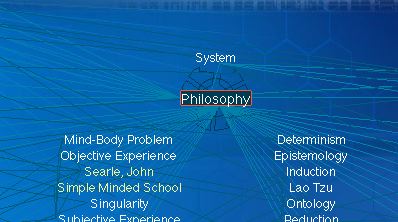I’ve been looking into open source content and document management systems. Two that seem appropriate are Apache Lenya – Open Source Content Management (Java/XML) and opencms.org: OpenCms – The Open Source Content Management System. They are both open source, XML based, and offer ways to hide the xml/html from authors and editors.
Kurzweil: Ramona and KurzweilAI.net

KurzweilAI.net is a web site by Ray Kurzweil dedicated to Artificial Intelligence. From there you can launch an avatar “Ramona” with whom you can converse. (If you have Windows you can install the FX Player and see her move and speak.) If you click on “The Brain” there is a great visualization of the connections between people, concepts, implementations (like Eliza) and related things. Clicking on items shows the connections and brings up short defintions and links. This is implemented in Java. Thanks to Alexandre Sévigny for this.
Continue reading Kurzweil: Ramona and KurzweilAI.net
Applying to Game Companies
“a graduate program for the left and right brain”
Carnegie Mellon’s Entertainment Technology Center has a project based Masters of Entertainment Technology. Their program is aimed mostly at developing games, thugh they define “entertainment technology” widely to include augmented reality, telepresence, and entertainment robotics.
They have a neat page with information on how to prepare applications and demo reels for the entertainment industry, see How To Documents. This is thanks to Paola Borin.
Research Online
The ESRC is running a Social Science Week Blog where there are invited talks online about research and learning online. In particular there are two papers around Social Sciences Online ª Research Methods. Neither of these papers deals with the topic I have previosly blogged, using blogs ethically, but they look at a parallel issue of online interviews and surveys.
Ethics and Blogging 2
Today I had another (see Ethics of Blogging) interesting discussion about the ethics of using blogs for research with folks from health studies. We taped it and hope to put it up as a podcast. Some of the participants are from a team that is exploring this and they have started a blog, Web Finds. I think there is something consistent in a circular way about a research team using a blog to keep track of, link to, and ping, other blogs they are reading as evidence. They, in effect, make their research trajectory open in the same way as that of their “subjects”.
OCLC: Gamers and Boomers
 The Online Computer Library Centre (OCLC) Newsletter (No. 267) has a set of stories about computer games and the difference between Boomers (born from 1946 to 1964) and Gamers (born after the 1970s). The conver story, The Big Bang! (Tom Storey) notes a shift from boomers who are career-driven, independent and idealistic to gamers who are motivated, resilient, confident and analytical. The story presents gamers as sociable (compared with boomers who are independent), which inverts the usual complaint that gamers are loners.
The Online Computer Library Centre (OCLC) Newsletter (No. 267) has a set of stories about computer games and the difference between Boomers (born from 1946 to 1964) and Gamers (born after the 1970s). The conver story, The Big Bang! (Tom Storey) notes a shift from boomers who are career-driven, independent and idealistic to gamers who are motivated, resilient, confident and analytical. The story presents gamers as sociable (compared with boomers who are independent), which inverts the usual complaint that gamers are loners.
Thanks to Susan for pointing me to this.
Continue reading OCLC: Gamers and Boomers
Leximancer

Leximancer is a text mapping and mining application that creates visualizations of texts that can be made available over the web in interactive form. See the Leximancer Gallery.
Continue reading Leximancer
Google’s Site Ranking Secret is Out
Great Site Ranking in Google The Secret’s Out is an article on how Google ranks sites based on a reading of their US patent application which describes their approach to ranking and how they deal with spam. The article was suggested to me by Matt Patey and is worth reading. Darren Yates, the author, concludes with “Overall keep it ethical and you can’t go far wrong.” (Yates, 6/11/2005, in Buzzle.com)
Topics in the Digital Humanities
Topics in the Digital Humanities is a new book series that Susan Schreibman has announced on various lists. The series will be edited by Ray Siemens and Susan Schriebman and it will be published by the University of Illinois Press.
Continue reading Topics in the Digital Humanities
Stemming and Text Analysis
Another candidate for a fundamental procedure for text analysis would be stemming. See What is Stemming? for example algorithms and applications.
Again, is Stemming a basic procedure for humanities computing?